Tradition plays a huge role in the world of baseball cards. That tradition may be constantly evolving, but there are some things that remain true.
Like Topps Baseball and the Rookie Card.
In a baseball card landscape that now includes dozens of brands and releases each year, Topps Rookie Cards continue to be one of the hobby’s biggest draws. They’re also one of its most consistent through lines. They might not be the fanciest or rarest cards. They don’t come with autographs or have serial numbers on the back. But they have tradition. And sometimes the simplicity that continuity brings is enough.
If one were to build a full run of Topps Rookie Cards since 1952, the year that’s largely credited as starting the company’s flagship run, they’d be looking at a collection of thousands of cards. Some years have lots of star RCs. Some years don’t have any major standouts. And then there are a couple of seasons where some baseball card quirks make certain Rookie Cards bigger than one would normally expect.
Charting the top Topps Rookie Cards is also something of a time of several generations of baseball. Just like the cards, the game has modernized over the years. But there are some things that remain timeless, no matter where they’re from. And therein lies a big part of tradition’s appeal.
The Best Topps Baseball Rookie Card from Each Year – 1952-2020
The following list includes a year-by-year breakdown of the most valuable card for each flagship Topps baseball set from 1952 to 2020. Only cards with the RC tag in the Beckett database are included. Because Topps Traded sets from 1983 to 1988 use the XRC tag, they’re not listed. When distribution for those sets became wider in 1989, they started receiving the the RC tag. So if you’re wondering why Barry Bonds, Bo Jackson, Jose Canseco, Will Clark and a handful of others don’t make the cut for 1986, that’s the reason.
1952 Topps Eddie Mathews RC #407
The biggest Rookie Card in the landmark 1952 Topps Baseball set isn’t Mickey Mantle. He’s in 1951 Bowman so it’s actually a second-year card. Instead, the honor goes to Eddie Mathews.
A couple of things are going on with this card that give it such significant value. The first is the fact that it’s a Rookie Card of one baseball’s all-time great sluggers. Within the context of the product, Mathews is also a scarce high number card, the last one in the set, that saw limited distribution.
Buy on:
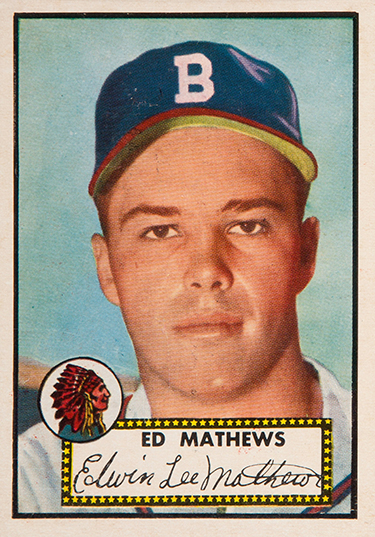
1953 Topps Jim Gilliam RC #258
Jim Gilliam isn’t a Hall of Famer like a lot of players on this list. He was a great player for the Dodgers for more than a decade, winning the 1953 National League Rookie of the Year Award in 1953. Gilliam was an All-Star twice and also finished among the top 10 NL MVP vote getters on a pair of occasions.
Needless to say, the list of Rookie Cards in 1953 Topps Baseball is nearly as strong as the two years it’s sandwiched between. Like Mathews, Gilliam is another high series short print.
Buy on:
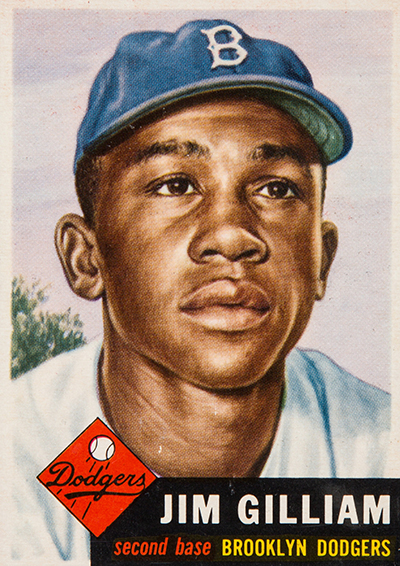
1954 Topps Hank Aaron RC #128
1954 Topps Baseball has a stacked Rookie Card lineup. Ernie Banks, Al Kaline and Tommy Lasorda are among them. But the best belongs to Hank Aaron, second on baseball’s all-time home run leaders list.
Aaron is truly one of the game’s giants. His place in the hobby reflects that. Like a lot of bluechip cards, the 1954 Topps Hank Aaron Rookie Card has seen some huge sales in recent years, with professionally graded Mint copies, such as PSA 9s, hitting six figures including a couple that have topped the $300,000 mark.
Buy on:
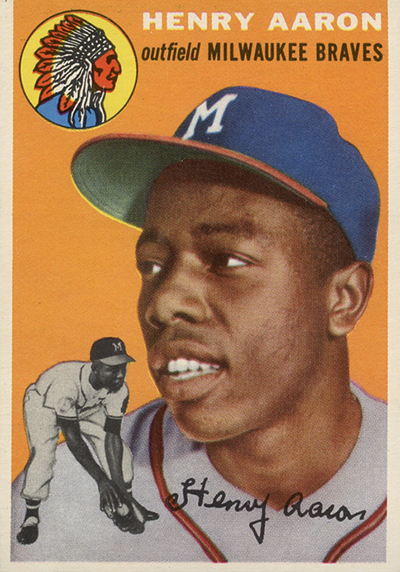
1955 Topps Roberto Clemente RC #164
The 1955 Topps Sandy Koufax and Harmon Killebrew Rookie Cards could have topped a lot of other sets, but not here. Instead, it’s Roberto Clemente headlining the RCs in an extremely loaded 1955 Topps Baseball set. It’s a testament to Clemente’s popularity in the hobby and beloved status as a baseball icon.
Buy on:
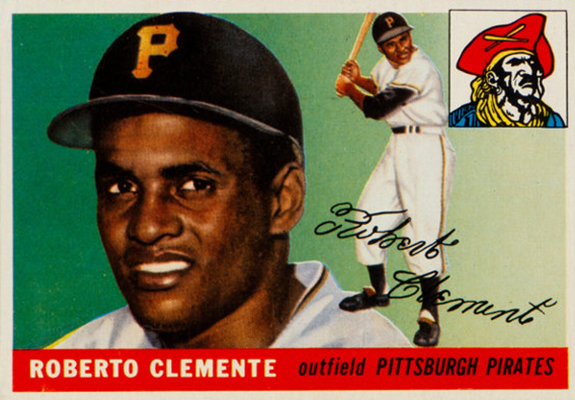
1956 Topps Luis Aparicio RC #292
Luis Aparicio is no slouch. He is a Hall of Famer, after all. But when you think of iconic 1950s baseball cards, Aparacio’s 1956 Topps Rookie Card probably isn’t one of them. At least not in the top tier. Herb Score gets RC runner-up status in a classic set, albeit one driven by design and veterans.
Buy on:
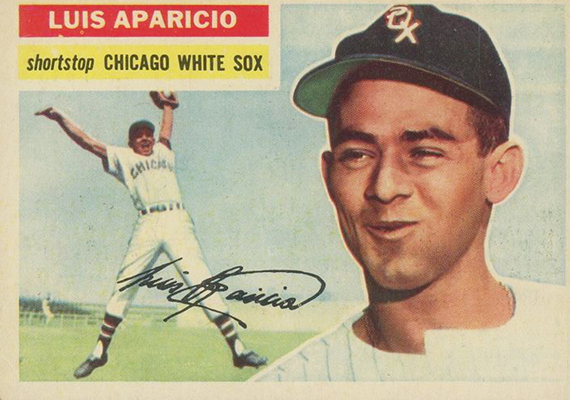
1957 Topps Brooks Robinson RC #328
1957 Topps Baseball is the tale of two Robinsons when it comes to Rookie Cards. And it’s Brooks who comes out on top over Frank Robinson, one of the greatest home run hitters of all-time. So how does Brooks Robinson finish ahead? Outside of Cal Ripken, he’s the face of the Baltimore Orioles. Robinson is also one of the greatest third baseman of all-time, perhaps the best, doing it at both the plate and in the field. The deep 1957 Topps checklist also includes Rookies of Don Drysdale, Bill Mazeroski and Jim Bunning.
Buy on:
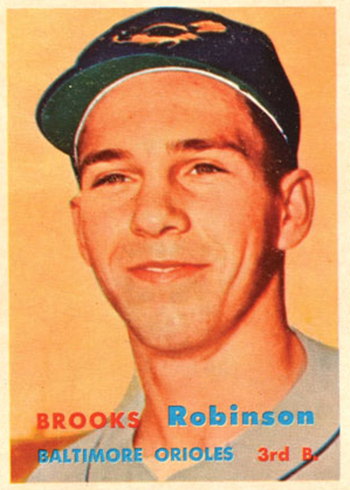
1958 Topps Roger Maris RC #47
Before McGwire, Sosa and Bonds, there was Roger Maris. And while he may be known best for his home run-hitting days wearing the pinstripes of the New York Yankees, Maris’ Rookie Card came from his early days with Cleveland. Other notable Rookie Cards in 1958 Topps Baseball include Hall of Famer Orlando Cepeda and Curt Flood.
Buy on:
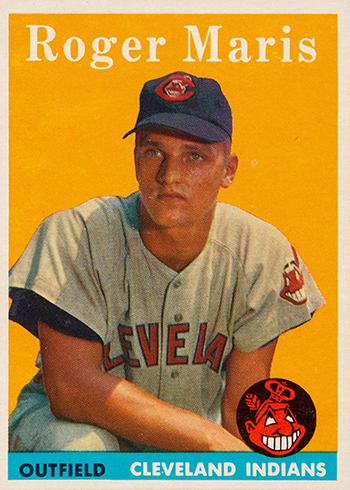
1959 Topps Bob Gibson RC #514
Bob Gibson is one of the most dominant pitchers not just of his era, but any era. His 1959 Topps Rookie Card also happens to be among the most iconic ever produced. The fact that it’s one of the set’s rarer high numbers adds to its value and appeal.
Buy on:
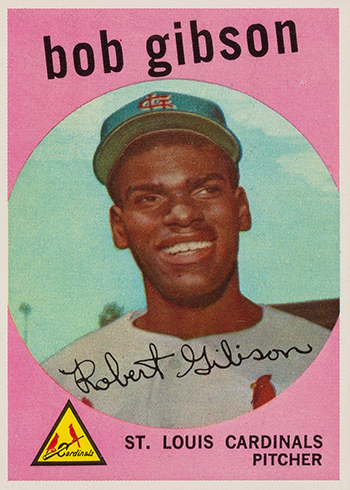
1960 Topps Carl Yastrzemski RC #148
Carl Yastrzemski is an icon for a franchise that has more than its share of legends. So it shouldn’t come as a surprise that Yaz’s Rookie Card is one of the most recognized of the ’60s. And that’s with the massive ribbon taking up much of the card. Or maybe it’s in part because of the ribbon.
1960 Topps Baseball also has another very notable Rookie Card, Willie McCovey.
Buy on:
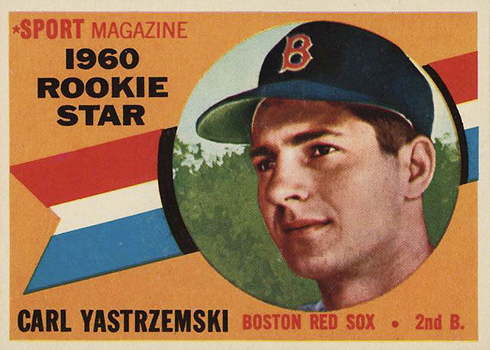
1961 Topps Juan Marichal RC #417 SP
The 1960s saw a lot of great pitchers take to the mound. Juan Marichal ranks among the best of them. That would be enough to make his 1961 Topps Rookie Card one of the most coveted in a set that also includes Ron Santo and Billy Williams. However, it’s another high number short print, making it harder to find and, thus, adding more value.
Buy on:
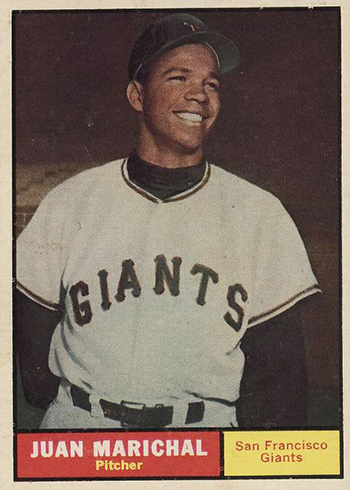
1962 Topps Lou Brock RC #387
Lou Brock is one of baseball’s great base stealers. He set the all-time record in 1977, although that was later topped by Rickey Henderson. Brock is one of those players that doesn’t command widespread attention in hobby circles but is still very much respected. Rookie Cards joining Brock in 1962 Topps Baseball include Joe Torre and Bob Uecker.
Buy on:
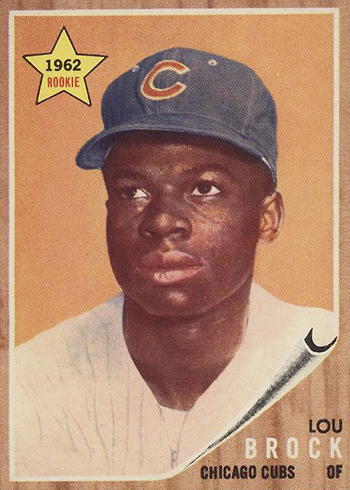
1963 Topps Pete Rose RC/Pedro Gonzalez RC/Ken McMullen RC/Al Weis RC #537
Let’s face it (no pun intended), Pete Rose has a lot of cards that are more attractive than his 1963 Topps Rookie Card and its quartet of floating heads. But when you’re baseball’s all-time hits leader, it doesn’t matter. This still ranks among the most popular baseball cards of all-time.
Buy on:
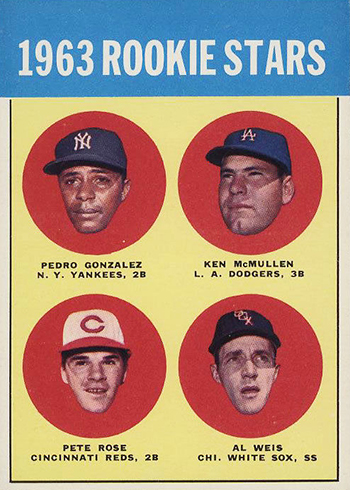
1964 Topps Phil Niekro RC/Phil Roof RC #541
The Rookie Cards in 1964 Topps Baseball are led by a couple of Phils. The one on top is a catcher who had a long career, albeit one that is rather insignificant by hobby standards. Basically, Phil Roof was great behind the plate and merely adequate when he stood at it. The other Phil on the card is a different story. Like Roof, Phil Niekro also had a lengthy career. This one resulted in his Hall of Fame induction in 1997. He’s a member of the 300 Win Club and a master of the knuckleball. To seal the deal, this is another Rookie Card given a high number boost.
Buy on:
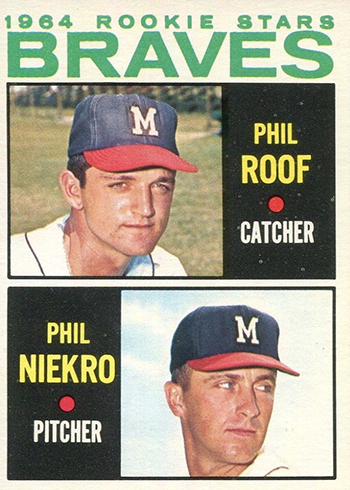
1965 Topps Steve Carlton RC/Fritz Ackley RC #477
The list of 1965 Topps Rookie Cards includes several Hall of Famers including Joe Morgan, Jim “Catfish” Hunter and Tony Perez. But the top card belongs to Steve Carlton, a four-time Cy Young Award winner. He’s paired with Fritz Ackley to make for a card that, visually, doesn’t have a lot of flair. But that’s standard for the majority of multi-player Rookies from the era. Coming from the higher part of the checklist makes this card a little more scarce but it’s not considered to be one a short print to the same level as Hunter, Perez and the rest of the final series, which starts at #523.
Buy on:
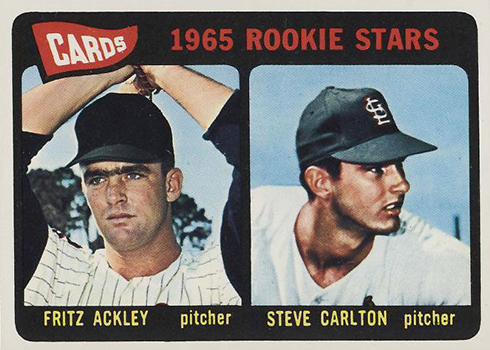
1966 Topps Bart Shirley RC/Grant Jackson RC #591
The high number short print strikes again. Jim Palmer might be a more famous card but when you’re looking strictly at value, the combo Bart Shirley and Grant Jackson is going to cost significantly more. Part of the tough 1966 Topps seventh series, it comes largely down to rarity as collectors work to finish their sets. And even within that last run, this is one of several short prints.
Buy on:
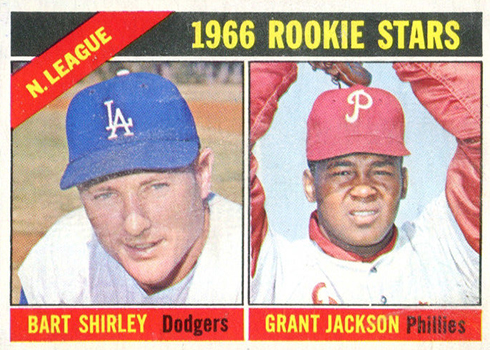
1967 Topps Tom Seaver RC/Bill Denehy RC #581
The design might be on the generic side, but boasting a young Tom Seaver, the card is anything but. In a decade filled with Rookie Cards of pitching greats, this is still one of the most popular. The fact that it’s a 1967 Topps Baseball high number adds to its intrigue. Bill Denehy’s MLB career spanned just three seasons and less than 50 total games.
Buy on:
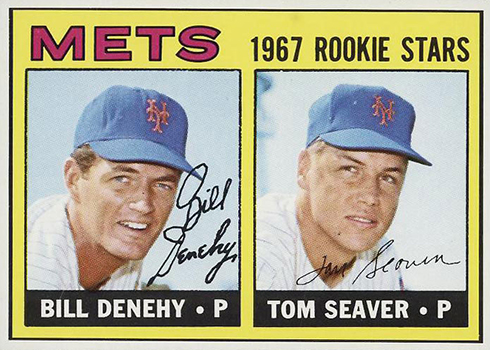
1968 Topps Nolan Ryan RC/Jerry Koosman RC #177
If every collector from the ’90s and earlier were asked to make a list of the top 25 most iconic cards of all-time, the 1968 Topps Jerry Koosman would probably be on 98 percent of those lists. Only, it’s not because of Koosman. A great pitcher? Absolutely. But he’s not the dominant young Texan next to him.
Buy on:
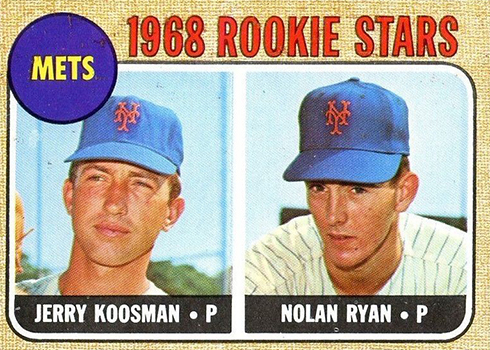
1969 Topps Reggie Jackson RC #260
For someone who oozed swagger and a flair for the dramatic during his career, the 1969 Topps Reggie Jackson is an understated affair. Amidst an era in the hobby where so many key Rookie Cards are multi-player affairs, Jackson stands out simply by standing alone. And while Rollie Fingers, Bobby Cox and Bobby Bonds are among the other RCs in 1969 Topps Baseball, Jackson’s iconic first Topps card towers over them all.
Buy on:
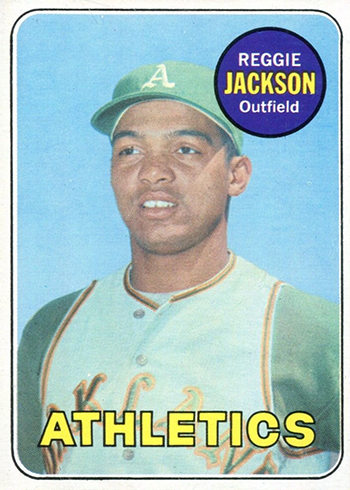
1970 Topps Thurman Munson RC/Dave McDonald RC #189
Thurman Munson may have only played for 11 seasons, but in that time, he established himself as one of baseball’s greatest catchers. He was a key part in a pair of Yankees World Series wins, was a seven-time All-Star, won a pair of Gold Gloves and, perhaps most importantly, was the Captain of one of the biggest franchises in all of sports. But Munson’s story is also marred by tragedy after being killed in a plane crash at the age of 32. Munson’s iconic 1971 Topps second-year card may be more recognizable but Munson’s MLB card story starts here, leading the 1970 Topps Baseball set.
Buy on:
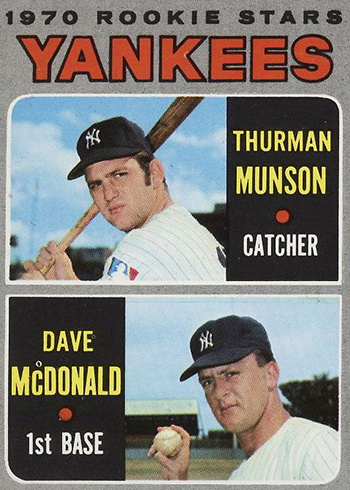
1971 Topps Dusty Baker RC/Don Baylor RC/Tom Paciorek RC #709
It’s rare to come across a multi-player Rookie Card where more than one player is a legitimate star. They do exist and this is one of them. While not Hall of Famers, Dusty Baker and Don Baylor certainly left their mark on the game. Not only were they good players, but both were standout managers as well. This card gets a bit of a boost due to the it being a short print in the already tougher final series. Other notables Rookie Cards in 1971 Topps Baseball include Bert Blyleven and Steve Garvey.
Buy on:
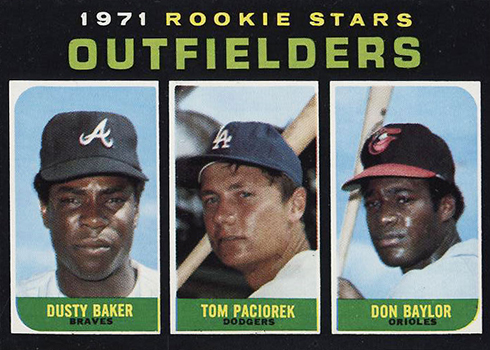
1972 Topps Carlton Fisk RC/Cecil Cooper RC/Mike Garman #79
Carlton Fisk is the obvious headliner for this three-player card. For starters, he’s one of the greatest catchers to ever play the game. On top of that, Fisk provided one of the most dramatic moments in World Series history with his Game 6 walk-off home run in 1975. But let’s not overlook the man in the middle either. Cecil Cooper was a five-time All-Star and finished in the top ten in MVP voting on four occasions.
Buy on:
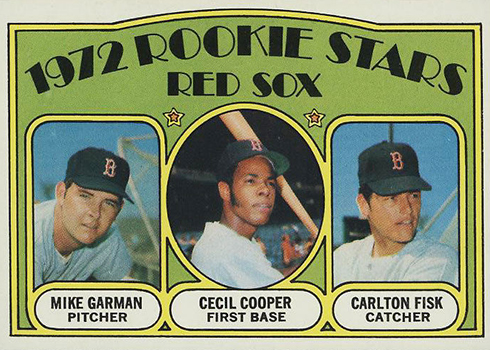
1973 Topps Mike Schmidt RC/John Hilton RC/Ron Cey #615
Not only is this the top Rookie Card in 1973 Topps Baseball, but it’s probably the most fashionable as well. Cey gives you some wings, Hilton has those glasses and Schmidt has those nifty chops. It’s not the fashion that makes this such an important card. It’s largely thanks to the man with the chops. Mike Schmidt is one of the greatest sluggers baseball has ever seen. He’s also one of the most beloved players of his generation. Six-time All-Star Ron Cey is a strong inclusion as well.
Buy on:
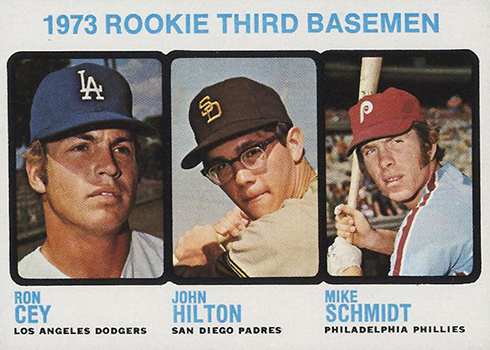
1974 Topps Dave Winfield RC #456
1974 Topps Baseball marked the first time the line released as one giant series. Gone were the handful of small releases throughout the year. Gone were the short prints that came with the high numbers. This puts everything on a level field and makes the best Rookie Card stand on its own merit. Ken Griffey? Great player and part of a legendary franchise. Dave Parker? One could argue he’s deserving of a Hall of Fame nod. But it’s Dave Winfield that is the easy choice.
Buy on:
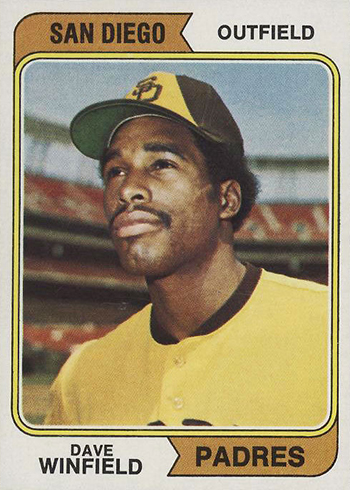
1975 Topps George Brett RC #228
Let’s face it, 1975 Topps Baseball is one of the greatest sets ever. It’s one of those releases that’s a convergence of a memorable design along with an excellent checklist. The 1975 Topps George Brett Rookie Card captures both of these sentiments. The Royals legend shares the RC spotlight with fellow Cooperstown inductees Robin Yount, Gary Carter and Jim Rice.
Buy on:
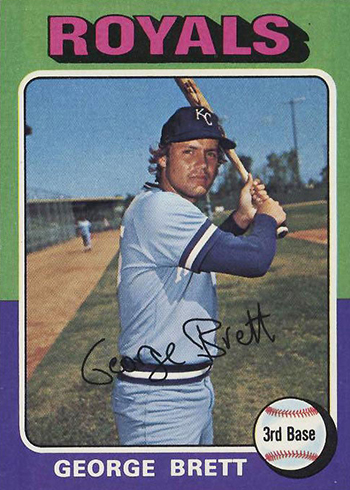
1976 Topps Dennis Eckersley RC #98
Dennis Eckersley was a different kind of pitcher. For the first half of his career, he was a starter and a good one at that, winning 20 games with the Red Sox in 1978. But in the late ’80s with the Oakland Athletics, he shifted to the bullpen and became one of the game’s truly dominant closers. Like a lot of Rookie Cards of pitchers, this one might not get the true attention it deserves.
Buy on:
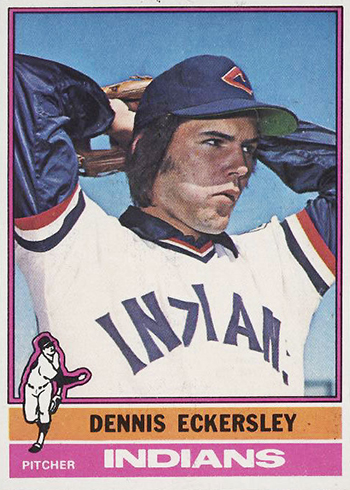
1977 Topps Andre Dawson RC/Gene Richards RC/John Scott/Denny Walling RC #473
Andre Dawson was one of the most dangerous hitters in the 1980s. His eight Gold Gloves show he was equally strong in the outfield. A perennial MVP threat in both Montreal and Chicago during his prime, Dawson’s crowded 1977 Topps Rookie Card might not be the most exciting. But it does top the set, which also has RCs of hobby-favorite Dale Murphy and Hall of Famer, Bruce Sutter.
Buy on:
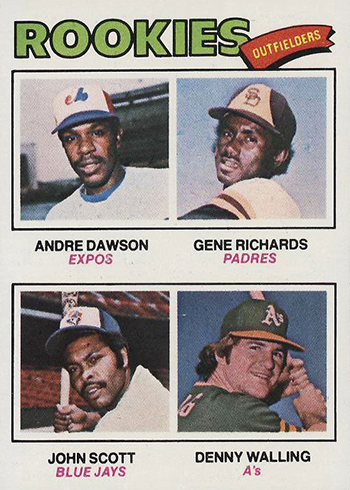
1978 Topps Paul Molitor RC/Alan Trammell RC/Mickey Klutts RC/U.L. Washington RC #707
If you go through the massive Topps catalog, there’s just one that has two Hall of Famers featured on the same Rookie Card — the 1978 Topps “Rookie Shortstops,” which is anchored by Paul Molitor and Alan Trammell. On the Cooperstown curve, both are more franchise favorites than hobby legends. The fact that they’re together on the same RC makes this one all the more notable.
Buy on:
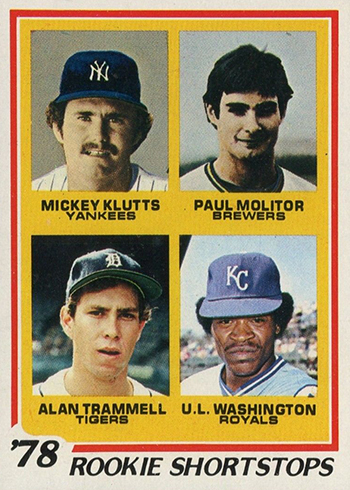
1979 Topps Ozzie Smith RC #116
This does not look like the Rookie Card of one the flashiest fielders to ever play the game. But under those sideburns is a fan favorite Hall of Famer. The fact that Ozzie Smith is in Padres colors and not St. Louis reds is also a little jarring. This is easily the most notable Rookie Card from Topps’ final set of the ’70s.
Buy on:
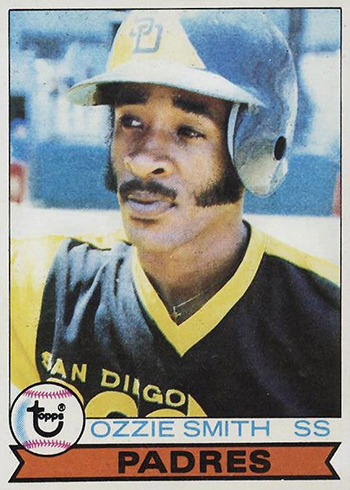
1980 Topps Rickey Henderson RC #482
The 1980s kicked off in style with Rickey Henderson anchoring the flagship release. It’s got a beautiful composition, something Henderson would probably tell you himself if you asked. The card may be perfect just the way it is, but it’s not perfect. The comic on the back has an uncorrected error. It mentions a game he had at Modesto stealing seven bases. It actually happened in Fresno.
Buy on:
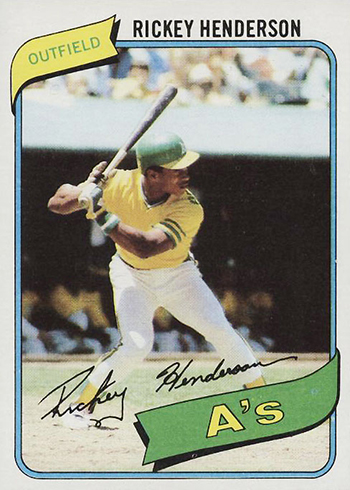
1981 Topps Fernando Valenzuela RC/Jack Perconte RC/Mike Scioscia RC #302
The fire of Fernando-mania doesn’t burn as brightly as it used to. But it hasn’t been completely forgotten, either. Being pictured alongside Mike Scioscia and his five World Series rings isn’t too shabby, either. There’s also some mystique around this card when it comes to grading. Not a single copy has received a Gem Mint grade from either BGS, PSA or SGC. When it comes to Rookie Cards, 1981 Topps is one of the line’s weaker sets of the decade. That said, it now has a couple of Hall of Famers in Tim Raines and Harold Baines.
Buy on:
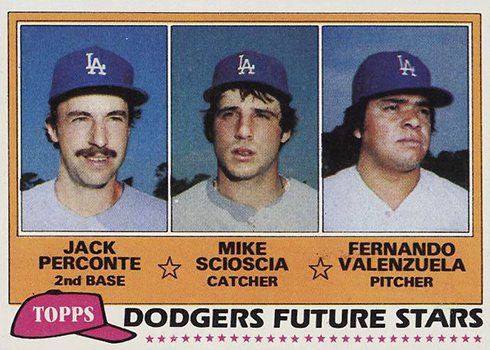
1982 Topps Cal Ripken Jr. RC/Bob Bonner RC/Jeff Schneider RC #21
You’re probably not buying this card for the guys on the left and right. It’s all about the man in the middle, Cal Ripken Jr. Easily the top of the 1982 Topps Rookie Card class, it’s actually the Traded version that has gained more traction, notoriety and value over the years. It’s Ripken’s first solo Topps card and tougher to find. It’s a special case for a special player.
Buy on:
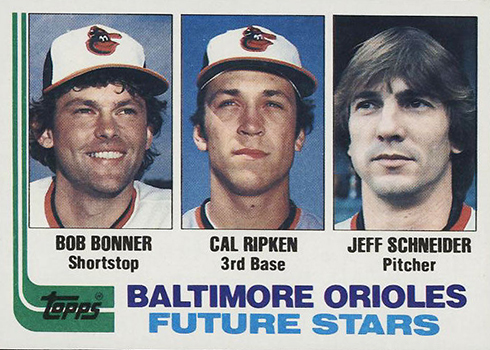
1983 Topps Tony Gwynn RC #482
Tony Gwynn is one of three Hall-of-Fame Rookie Cards in the classic 1983 Topps set. For years, Gwynn, Wade Boggs and Ryne Sandberg all held similar values. And while they’re not too far apart today, Gwynn has emerged as the clear favorite. His beloved stature, the memorable design, that old Padres uniform — all help contribute to the card’s place in history as one of the greatest cards of not just this set but the entire decade. Really, all that’s missing is Gwynn’s beaming smile.
Buy on:
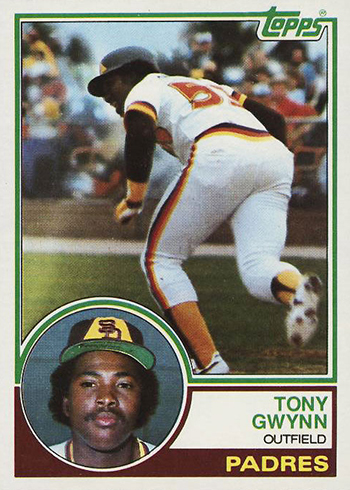
1984 Topps Don Mattingly RC #8
The 1984 Topps Don Mattingly Rookie Card may not be on quite the same level as its Donruss counterpart, but it’s still one of the decade’s most iconic cards. With a multi-image design that spins out nicely from 1983, it has a memorable look to go along with the superstar (and very popular) player. While there are several recognizable names in 1984 Topps Baseball, Darryl Strawberry is the only other major star.
Buy on:
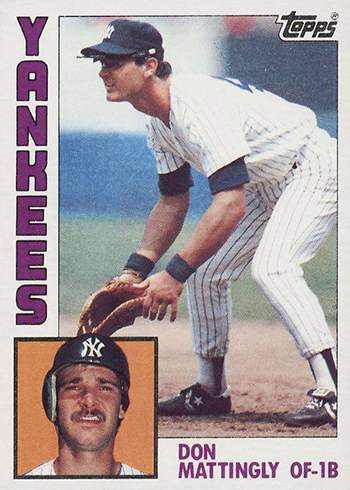
1985 Topps Mark McGwire RC #401
When you talk about the highs and lows of 1980s baseball cards, few have seen greater swings in both directions than the 1985 Topps Mark McGwire. It’s easy to point out today how it’s not worth nearly as much as it was in 1998 or 1999. This is true. But that’s only part of the card’s story. The USA spin is unforgettable. It also spurs debate still today among some over whether it should be a Rookie Card given that McGwire’s not with a MLB team.
Buy on:
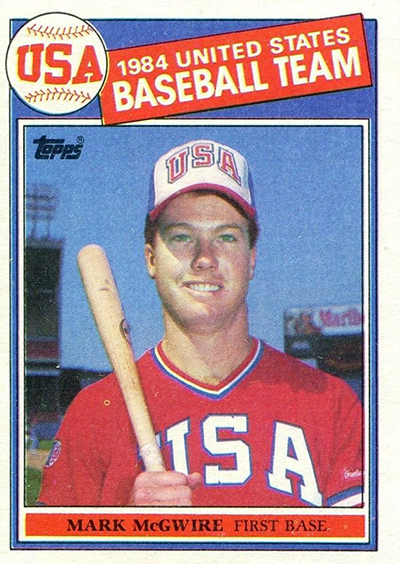
1986 Topps Ozzie Guillen RC #254
Some years are filled with multiple Hall of Famers getting Rookie Cards. In 1986 Topps, you get Ozzie Guillen. For a while, he was one of the better shortstops in the game. He also won a World Series as manager of the White Sox. Let’s face it, Guillen is not your typical “Best in Class” Rookie Card. But surrounded by the likes of Cecil Fielder, Darren Daulton and Harold Reynolds, Guillen takes top spot basically by default.
Buy on:
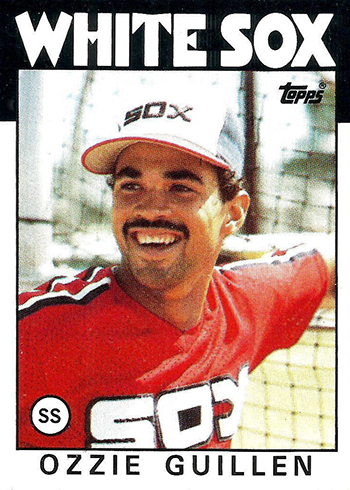
1987 Topps Barry Bonds RC #320
Ah, the glorious woodgrain of 1987 Topps Baseball. To many, it’s a favorite. And there’s still plenty of it to go around. This is a big reason why its value is still comparable to a sandwich sitting in a sketchy gas station cooler. This is one of those cards that’s easier to love (or hate) for what it is rather than dream about what could have been.
Buy on:
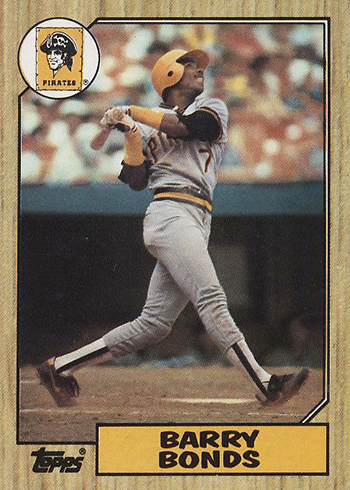
1988 Topps Tom Glavine RC #779
Being “valuable” in 1988 Topps Baseball is a relative thing. There’s lots of it out there and the list of Rookie Cards on the checklist isn’t the greatest. However, it does include one of the greatest pitchers of the 1990s, two-time Cy Young Award winner Tom Glavine. He finished in the top three in National League voting on four other occasions. Glavine, Greg Maddux and John Smoltz formed one of the most dominating pitching cores baseball has ever seen. Maybe the best.
Buy on:
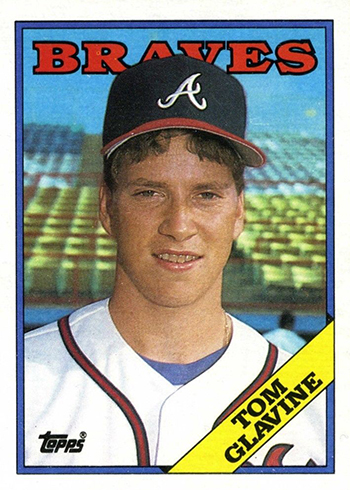
1989 Topps Traded Ken Griffey Jr. RC #41T
The 1989 Topps Traded Ken Griffey Jr. Rookie Card isn’t as famous or valuable as its Upper Deck counterpart, but it’s still plenty gorgeous. Topps missed the boat by not including Griffey in their main set like UD, Donruss and Fleer did. However, he anchors the box set.
1989 also marks the first time that cards from the Topps Traded box set got RC tags instead of XRC status in the Beckett Price Guide. This is because of a wider distribution for the sets, thanks in part to the hobby’s explosion in popularity at the time.
Buy on:
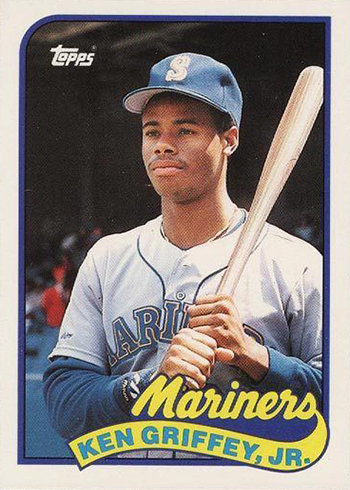
1990 Topps Frank Thomas RC #414
It wasn’t long after this card came out that “The Big Hurt” was one of the most featured hitters in baseball and most popular players in the hobby. Given the quantity with which the 1990 Topps Frank Thomas Rookie Card is available, it’s not going to ever be worth a lot in its most basic form. But there are a couple of others to chase including Topps Tiffany, which has nicer stock and a much smaller production run. There’s also the ultra-scarce No Name on Front error that has gone on to be one of the most coveted cards of the era.
Buy on:
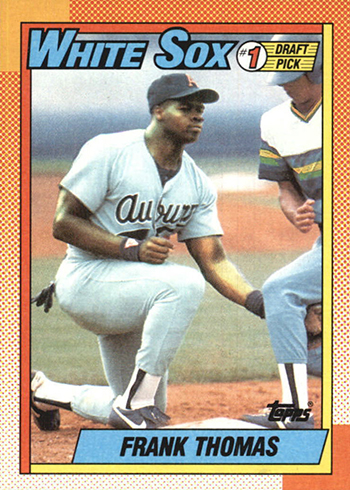
1991 Topps Chipper Jones RC #333
Chipper Jones was a spark plug for Atlanta’s offense for two decades. He helped lead the team to the postseason a dozen times, including a World Series win in 1995. The 1999 National League MVP hit .303 for his career, hitting 468 home runs and driving in over 1,600 runs. His 1991 Topps Rookie Card isn’t worth much in its regular form thanks to a massive supply. However, the Tiffany version is tough. There’s also the Desert Shield version that is also rare and has some history behind it.
Buy on:
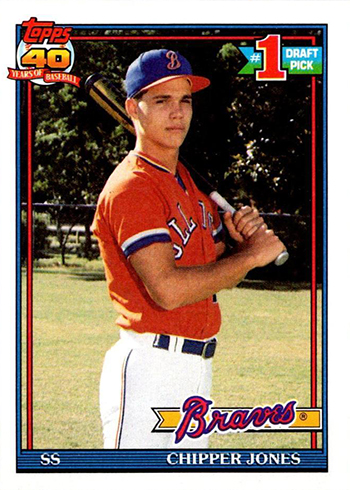
1992 Topps Traded Nomar Garciaparra RC #39T
Many will remember there was a time when Nomar Garciaparra was the headliner in a “Golden Age” of shortstops in a list that also included Derek Jeter and Alex Rodriguez (and Rey Ordonez). It was around this time that this was among the hottest baseball cards in the hobby. While Nomar still had a strong career, neither his numbers or the values of this card lived up to expectations. It’s a case where the card is still great but it’s colored by a tinge of what could have been.
Buy on:
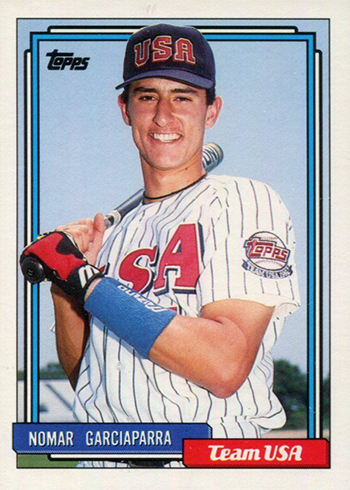
1993 Topps Derek Jeter RC #98
The Captain headlines the 1993 Topps Baseball checklist and for good reason. A key part of five World Series Championships — with the Yankees — he was one of the best players in the game from the late ’90s through the first decade of the new millennium. Jeter finished in the top 10 of AL MVP voting every year but one between 1997 and 2009. Playing in the pinstripes only helped increase his popularity in the baseball card world. Found in Series 1 packs, it also has a Gold parallel that’s popular. Topps also issued a pair of special factory sets in 1993 honoring the inaugural seasons of the Colorado Rockies and Florida Marlins. Each of these sets have a special stamp and much lower production run.
Buy on:
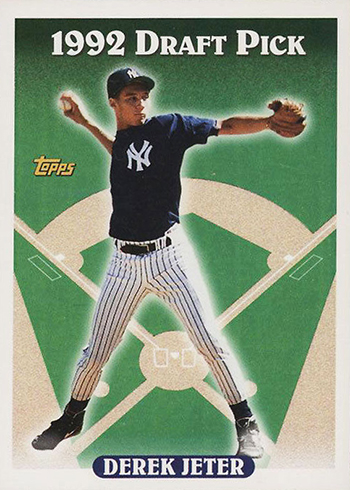
1994 Topps Traded Paul Konerko RC #112T
Paul Konerko would be a first-ballot player in the Hall of Very Good but you’re probably not going to see him inducted into Cooperstown any time soon. His numbers are good and he’s held in high regard by White Sox fans, but he’s not quite in the elite of the elite. Paul Konerko’s RC in 1994 Topps Traded tops a checklist that has several other good players that had their moments including Rusty Greer, Ben Grieve and Jason Schmidt.
Buy on:
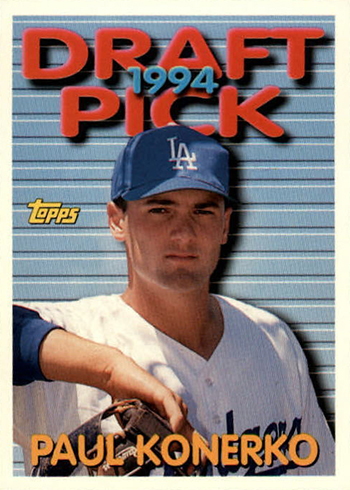
1995 Topps Traded Carlos Beltran RC #18T
As far as modern baseball cards go, the 1995 Topps Traded Carlos Beltran Rookie Card is one of the biggest snafus of all. Even at a glance, it’s pretty obvious that’s not Beltran. It turns out someone mixed up his photo with teammate Juan LeBron’s. So Beltran’s photo is on LeBron’s card and vice versa. There have been several cases of mistaken identities over the years. However, they don’t usually come on a possible Hall of Famer’s lone RC.
Buy on:
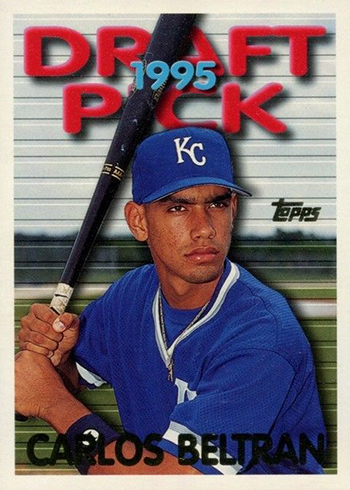
1996 Topps Sean Casey RC #25
Sean Casey is one of those players that falls squarely under the labels “very good” and “fan favorite,” particularly as a member of the Cincinnati Reds. Casey’s 1996 Topps Rookie Card was hot for a couple of years but then settled into that spot of recognizable but cheap. It’s part of a noticeable lull for the flagship set for a few years as far as RCs go. A big part of that may have been because Topps Traded was shelved for a few years and Bowman became the place for Rookie Cards.
Buy on:
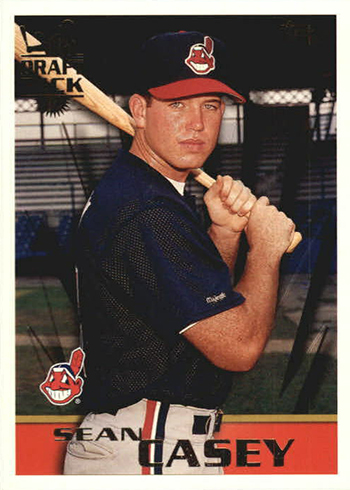
1997 Topps Eric Chavez RC/Adam Eaton RC #479
Eric Chavez and Adam Eaton were the tenth and eleventh picks in the 1996 draft. As one can imagine, there was a time when this card carried some clout. But the window was a small one. Both players had lengthly MLB careers. Chavez was a standout at third base, winning six Gold Gloves. Eaton never went a season with an ERA lower than 4.00. The card is symbolic of 1997 Topps Baseball as a whole. Overall, it’s not horrible. It just doesn’t stand out much.
Buy on:
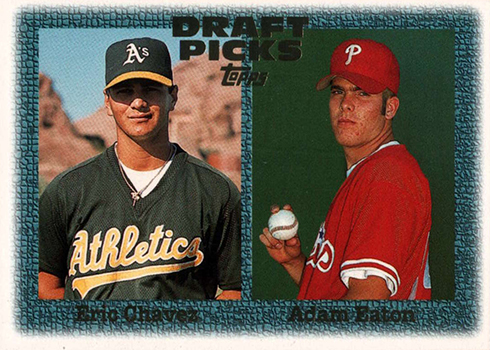
1998 Topps Cory Lidle RC #348
When it comes to Rookie Cards, 1998 Topps Baseball doesn’t have much. In fact, with less than 20 in the entire product across two series, there aren’t many Rookies, period. Cory Lidle was a journeyman, playing for six teams over nine seasons. Unfortunately, his story is one that ends in tragedy after he was killed in a flying accident in 2006.
Buy on:
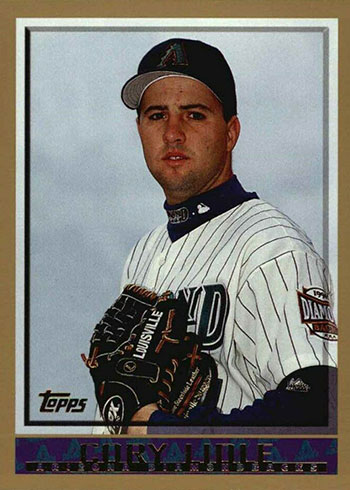
1999 Topps Traded C.C. Sabathia RC #T33
C.C. Sabathia is one of those players that everyone knew about but never garnered a huge hobby following. Winner of the 2007 AL Cy Young Award, he finished in the top 5 of voting in each of the four years after that as well. And while Sabathia is the biggest player to emerge from a once promising 1999 Topps Traded rookie crop, it’s still a relatively inexpensive card.
Buy on:
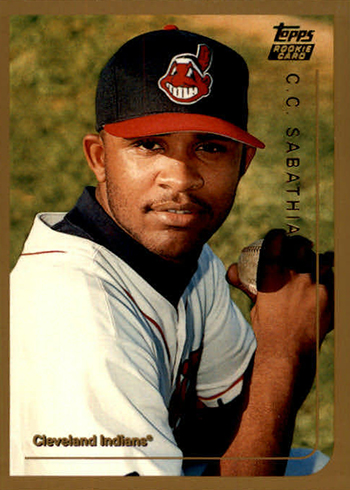
2000 Topps Traded Miguel Cabrera RC #T40
Although he’s slowed for much of the latter part of his career, Miguel Cabrera is one of the best hitters of his generation. Playing for the Marlins, it took the collecting world a little while to notice it. And given the quiet finish, his cards don’t make a lot of noise now. His two Rookie Cards are exceptions. They’re clear standouts in the two years that Topps returned to the box set format for Topps Traded and Topps Chrome Traded. While the autograph gets most of the attention in 2000 Topps Traded, the base version is a strong seller, especially when you consider it’s not particularly difficult to find.
Buy on:
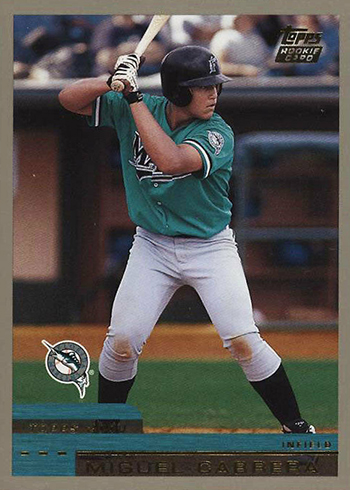
2001 Topps Traded Albert Pujols RC #T247
2001 was a crazy year for baseball cards. Albert Pujols and Ichiro both burst onto the scene and the chase was on for anything and everything with their names on it. While both are popular still today, Pujols’ 2001 Topps Traded card comes out on top in flagship.
Buy on:
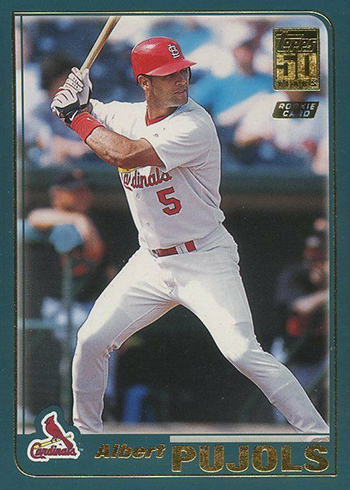
2002 Topps Joe Mauer RC #622
Even with his magical exit at the end of 2018, the second half of Joe Mauer’s career wasn’t as memorable as the first. While that certainly had an impact on his place in the hobby as a whole, Joe Mauer Rookie Cards are still looked at with a high level of regard. Value-wise, they didn’t stay at the highs that some may have expected, but this is still someone who will, at the very least, be a part of some Hall of Fame discussions and debates.
Buy on:
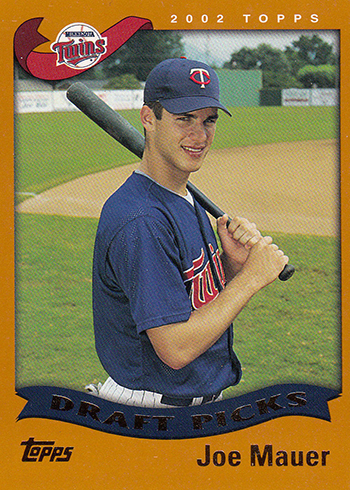
2003 Topps Traded Robinson Cano RC #T200
It has been a few years since we really recognized it, but Robinson Cano is one of the greatest to ever play second base. He ranks number two on the all-time home run list for the position behind Jeff Kent. Cano has hit .300 or higher nine times. He’s finished in the top 5 in AL MVP voting four times. And it’s not just Cano’s bat that made him great. He’s also got a pair of Gold Glove awards. Add to that the fact that he spend a good chunk of his career with the Yankees and it’s easy to understand the popularity of his 2003 Topps Traded Rookie Card.
Buy on:
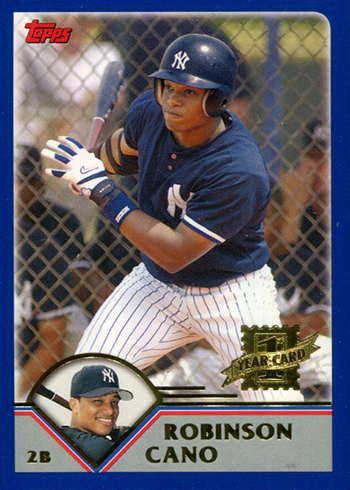
2004 Topps Yadier Molina RC #324
Yadier Molina has quietly put together a career worthy of Hall of Fame consideration. On paper, his offensive numbers might not stack up, but there’s a lot more to Molina’s case. With nine Gold Gloves, it’s hard to argue against him being the best defensive catcher of his generation. Molina also has a pair of World Series rings and is a nine-time All-Star. Molina’s Rookie Cards have been growing consistently over the years, including his appearance in 2004 Topps Baseball.
Buy on:
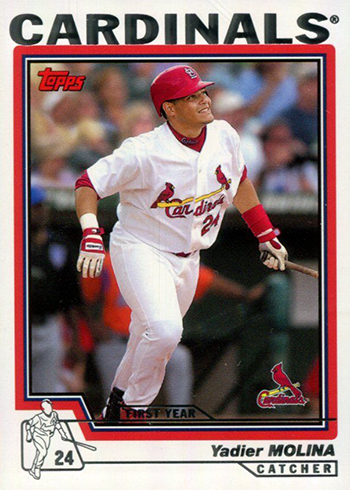
2005 Topps Justin Verlander RC #677
It’s hard to say that Justin Verlander has put together a Cooperstown-worthy career quietly. He’s one of the more vocal players since the dawn of social media. But tweets don’t necessarily translate into a hobby following. Collectors are generally apprehensive about pitchers until their place in history is ensured. For every Verlander there’s a Todd Van Poppel, Brien Taylor and Alex Fernandez. The two-time American League Cy Young winner and three-time runner-up has proven to be one of the most dominant pitchers of his generation. Pretty soon, as Verlander’s career winds down, you’ll probably start to hear more people replace “his generation” with “all-time.”
Buy on:
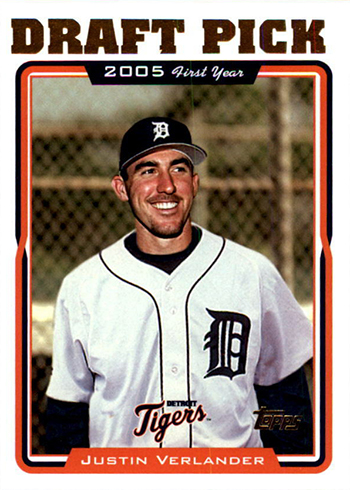
2006 Topps Update Jon Lester RC #UH149
In 2006, the MLBPA and MLB changed how players could appear in sets. To make the cut in a major league base set, a player actually had to make it to the majors. Before this, draft picks and prospects appearing in base sets were common. That’s the essence of it. Over the years, there have been some exceptions and prospect sets have blurred lines even further. But if you want to get into the basics of a Rookie Card, from 2006 forward it was major leaguers only. So for a few years, there was something of a transition for RCs because lots of draft picks had cards before this. But that didn’t mean the end of Rookie Cards.
Jon Lester might not be the biggest star, in baseball or in the collecting world, but he commands a certain level of respect in both regards. He’s been in the top 5 in Cy Young voting three times. He’s also a proven winner with three World Series rings.
Buy on:
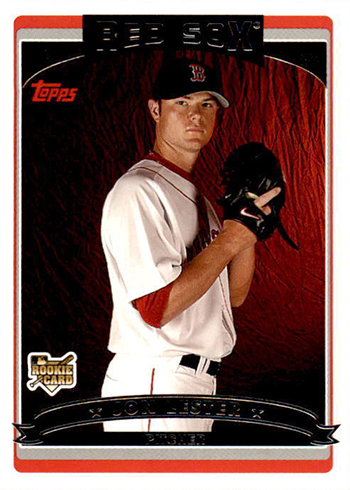
2007 Topps Update Justin Upton RC #UH327
As the first overall pick in the 2005 draft, expectations were always high for Justin Upton. And there have been times where he’s met them. But hype and reality are two different things. And the reality for Upton is that, overall, he hasn’t met the expectations placed upon him. Combine that with a significant amount of bouncing around to different teams and you’ve got something that’s “best” almost by default — the leader in a year where Photoshopped presidents and outfield-dwelling squirrels got more attention in the hobby.
Buy on:
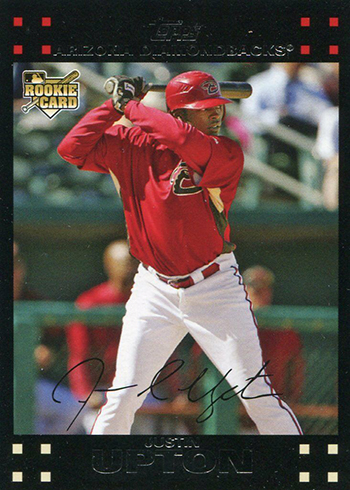
2008 Topps Update Clayton Kershaw RC #UH240
It turns out those comparisons to Sandy Koufax had some merit. Clayton Kershaw has already proven to be one of the best pitchers of his generation. And with each passing year, both baseball and collectors are coming to appreciate his bigger place in baseball history. Like several Update Rookie Cards, the 2008 Topps Update Clayton Kershaw has shown significant growth in recent years.
Buy on:
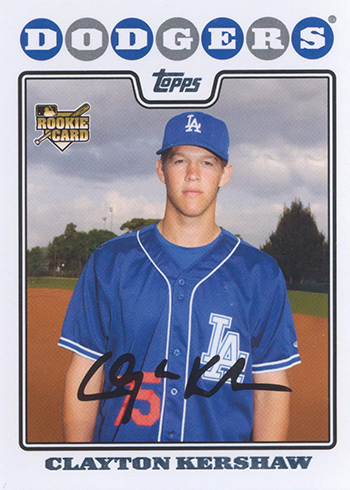
2009 Topps Daniel Murphy RC #182
Daniel Murphy is a three-time All-Star and the NL MVP runner-up in 2016. He’s one of those players that fits the mold of star player but not exactly a hobby star. There was one short stretch, though, when his cards were hot. During the 2015 postseason, he went on a tear, hitting seven home runs over a nine games. Murphy was named the 2015 NLCS MVP, helping the Mets make it to the World Series. After moving to the Washington Nationals the following season, he had his best regular season. But he’s slowed down significantly since then. In short, 2009 Topps Baseball isn’t big on major Rookie Cards.
Buy on:
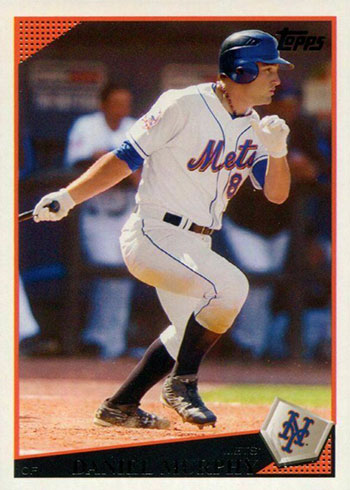
2010 Topps Update Giancarlo Stanton RC #US50
The slugger formerly known as “Mike” is one of the game’s best home run hitters in an era where dingers are flying at a furious rate — when he’s healthy. Stanton even managed to ascend the hobby ranks while playing for the Marlins, a team that it’s hard to breakthrough on. The card ushers in a decade that has plenty of major Topps Update Rookie Cards.
Buy on:
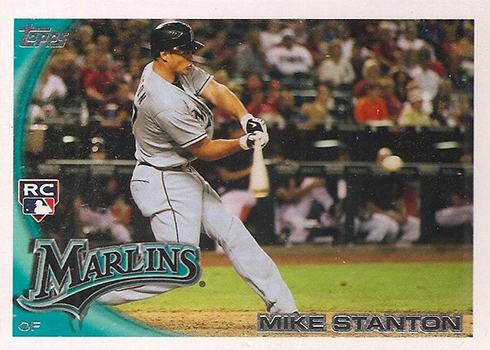
2011 Topps Update Mike Trout RC #US175
The 2011 Topps Update Mike Trout Rookie Card has become a symbol of sorts for modern baseball cards. With his 2009 Bowman Draft autograph long out of reach for the average collector, this card has seen tremendous growth. There are a few reasons. For starters, Trout only has a couple of Rookie Cards. And of those, flagship brings a lot of tradition. This opens it up to a variety of collectors. And coming from Update, it’s significantly more limited than cards from 2011 Topps Series 1 and Series 2. Is it rare? No. But compared to those two sets, it’s not as plentiful. And as the card has taken on a life of its own, it has also helped its status as it continues to gain attention.
Buy on:
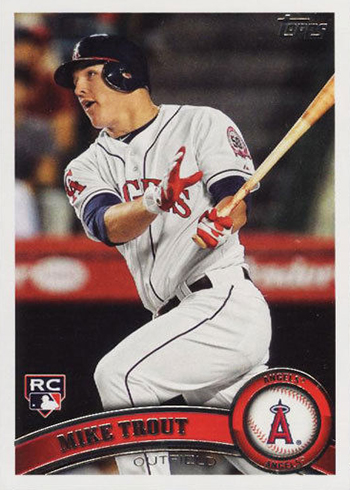
2012 Topps Bryce Harper RC #661
After making his MLB debut at the end of April, Topps managed to sneak Bryce Harper into 2012 Topps Series 2, which came less than two months later. To do so, he was a tough-to-pull short print. It’s not quite as scarce as his 2012 Topps Archives card, but still a tough find. Factory sets also have a Bryce Harper #661 card, although these were done as a couple of different variations.
Buy on:
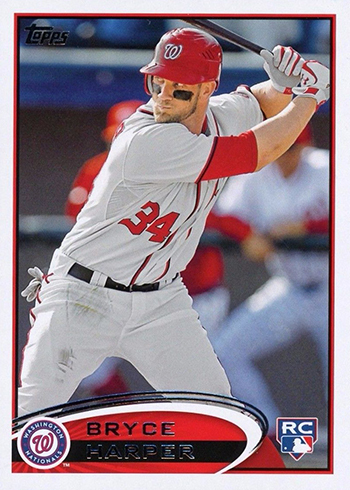
2013 Topps Update Christian Yelich RC #US290
It took a few years (and a trade to Milwaukee) for Christian Yelich to emerge as a hobby superstar, but here he is. His 2013 Topps Update Rookie Card is part of a set that is aging very nicely. Joining him on the checklist are Nolan Arenado, Didi Gregorius, Yasiel Puig, Corey Kluber and more. But it’s Yelich who has soared to the top. It also continues a very strong run for the Topps Update line.
Buy on:
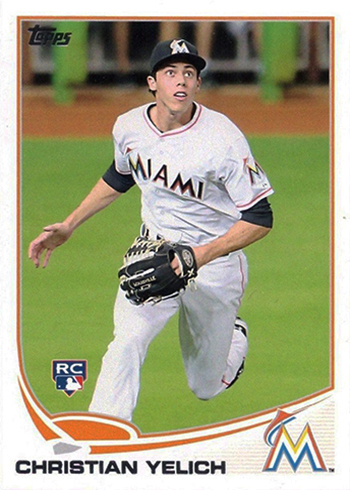
2014 Topps Update Mookie Betts RC #US26
Even before his MVP season in 2018, the 2014 Topps Update Mookie Betts Rookie Card was starting to creep up. Being the top player on one of baseball’s most popular franchises for several years, there’s a lot going on here. The fact that Betts doesn’t have a lot of Rookie Cards, either (relatively speaking), only helps its stature.
Buy on:
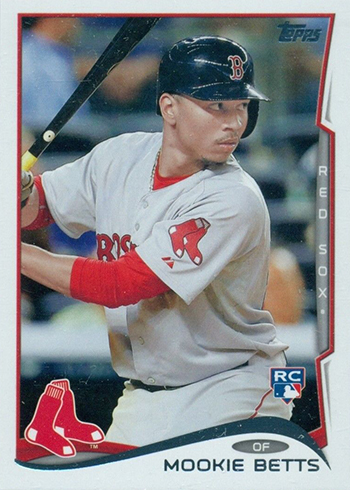
2015 Topps Kris Bryant RC #616
No matter how his career plays out, Kris Bryant will forever be known as one of the players who brought the World Series back to Wrigley. But more than that, he’s one of the game’s biggest stars and his 2015 Topps Rookie Card has been popular since its release. Bryant made his debut early enough in the season that they were able to squeeze him into Series 2 and not even as a short print like Harper was in 2012.
Buy on:

2016 Topps Update Willson Contreras RC #US266
2016 is one of those years that has several stars with Rookie Cards but not that one major superstar. And those that have come close, have been slowed by injuries. For the moment, Willson Contreras gets the edge. He’s a key part of one of baseball’s most popular teams. Contreras also has a knack for coming through at big moments. Another factor with his Rookie Card in 2016 Topps Update is the fact that it’s one of only a handful of Contreras RCs. Fellow 2016 rookies like Gary Sanchez, Trevor Story and Corey Seager have dozens. Contreras has six. And although not particularly rare, Update is believed to be the lowest produced set from the flagship line.
Buy on:
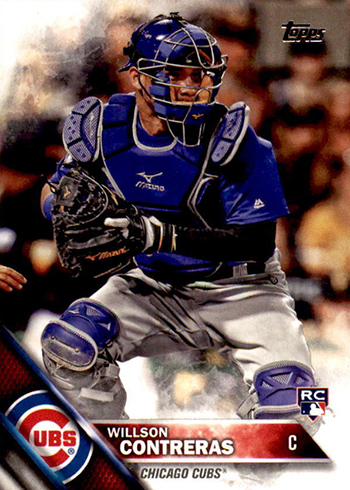
2017 Topps Aaron Judge RC #287
Even if you’re the furthest thing from a Yankees fan, Aaron Judge’s rookie season was more than impressive. The home run record, the pinstripes and his friendly demeanor all contributed to making Judge an instant superstar. The last name certainly helped in the marketing department as well. While there are plenty of Aaron Judge Rookie Cards to choose from, this one will hold a strong play historically as Topps continues to share its flagship heritage.
Buy on:
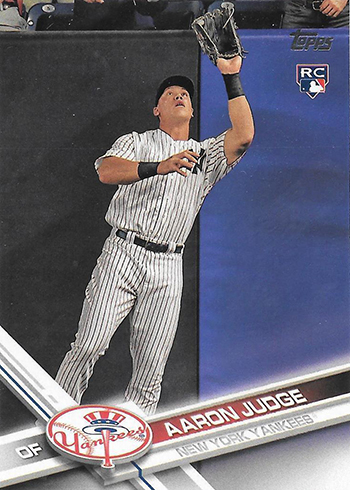
2018 Topps Update Ronald Acuna RC #US250
Despite Acuna’s high-profile rookie season, this card didn’t take off right away. In fact, 2018 Topps Update may have even slumped a little for its first few months on the market. But around the start of the 2019 season, Acuna’s flagship Topps Rookie Card took off. Acuna also has a variation short print found in Series 2 packs. However, as a variation, it doesn’t get the RC tag. That said, it’s still an extremely coveted card.
Buy on:
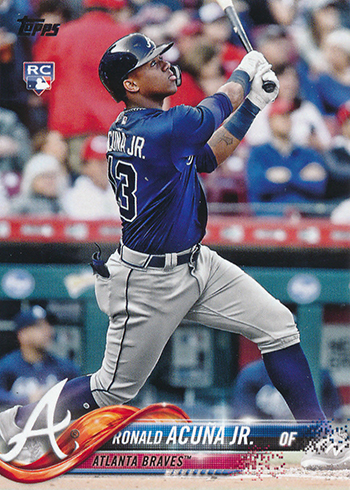
2019 Topps Fernando Tatis Jr. RC #410
Pete Alonso may have broken the rookie home run record but collectors appear to be playing the long game with 2019 Topps Baseball. Prices on Fernando Tatis Jr. Rookie Cards have surpassed comparable Alonso cards when it comes to prices. It’s still early, though. Like 2018, there’s a deep class to draw from that also includes Keston Hiura, Vladimir Guerrero Jr. (whose Series 2 SP is considered a variation insert and not an RC), Eloy Jimenez and more.
Buy on:
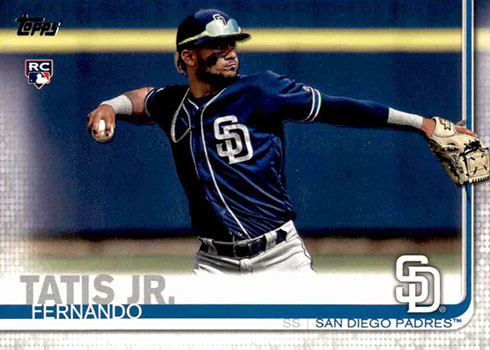
2020 Topps Luis Robert RC #392
The change in 2006 where players could only appear in a major league base set after their debut? Well, here’s an exception. After signing a long-term deal with the White Sox before the 2020 season, all signs pointed to Luis Robert being with the team on Opening Day. And then COVID-19 hit and the start of the season was pushed back. By the time 2020 Topps Series 2 arrived, things still hadn’t started. But Robert, one of the biggest prospects in White Sox organization in years, was making regular appearances in the year’s products, including this one. He has several additional variations as well, including appearances on a couple of extremely tough SSSP cards.
Buy on:
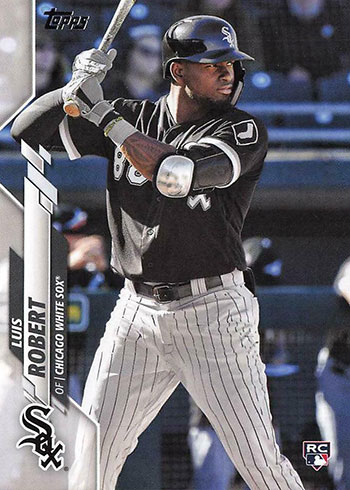
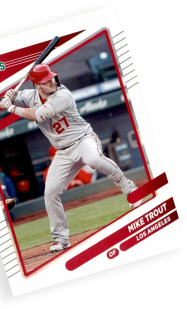
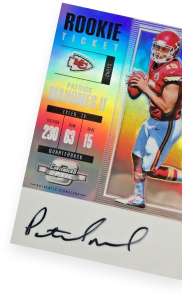


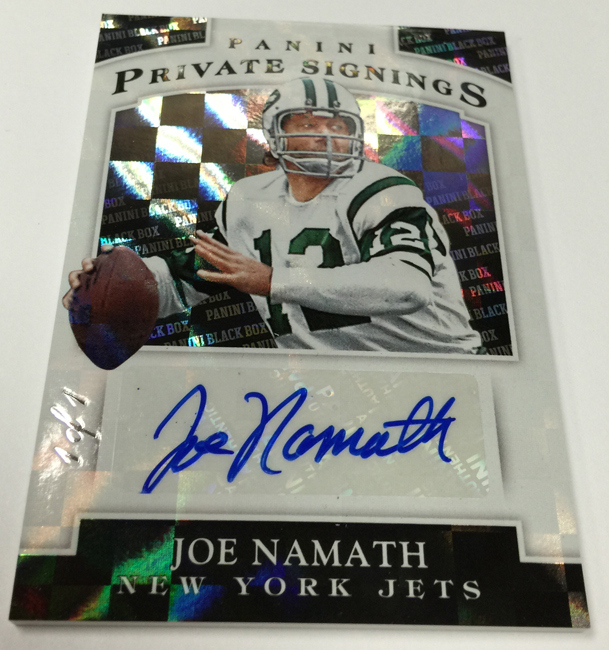


Thanks for putting this together, it was a fun read.
I will always love 1988 Topps because that’s the first set I ever collected, even if it may be the worst one of all time, LOL
This is an interesting story. Although I do have to take issue with the sub headline of “Best” Rookie Card from each Topps set. “Most valuable?” Sure. “Highest priced?” Sounds good. Even “My personal favorite” would work. But to equate price with best just doesn’t fly with me. Nobody will ever convince me that a Bart Shirley/Grant Jackson rookie is “better” than a Jim Palmer rookie along with several others. It’s a very interesting read, but I just think that particular wording is very, very wrong.
@JDonovan – Yes, “Best” can be interpreted different ways. Here there is an entire paragraph explaining its use in this piece.
I have dese cards
i have been trying to sale my baseball cards. from 1901 – 2020 ]lease help me. i have football cards , basketball cards. and pookie man crads.
2019 – Vlad Jr
2020 – Bo Bichettes
Those are both better then what’s listed.
Great piece. Lot of fun to look at. I believe that the 1966 pick is just wrong. Palmer consistently eeks out higher value for the same condition. Of course, his Venezuelan card is the rookie the get for 1966.
I believe that 1986 Ozzie Guillen is wrong, I think Jose Canseco’s Traded issue is more expensive, and I see that other traded issues have been used on the list, ie. Griffey, Nomar and konerko
@Scott – The article explains in a couple of places why Topps Traded sets from before 1989 were not included.
I have some Topps limited edition Nolan Ryan baseball cards that are hard plastic. On the back there are letters and numbers in handwritting. I can’t find any info on these cards, can you give me any or tell me where to look? I have one of your older books and wasn’t able to find anything in there either. Thank you!!! Donna Marriner
Hi, I have a Brett Favre rookie card, when he was drafted by the falcons. Trying to price it.
I have A William Roaf (n.o. saints) card #264 & his name is not printed on card & the lil gold emblem N corner of card like it’s barely done U can’t C it but U can feel it. Would that B worth money very good condition
Any chance Becket would ever add Topps Bunt or NFT cards to a list like this? Yes digital cards are coming fast and they are real! Digital cards are collectibles in the same way as physical cards. Their built-in scarcity is no different than a printer printing paper products with built-in scarcity. Digital cards must exist within a restricted framework, like the Topps Bunt app or from a blockchain. In fact, physical print runs are much more secretive and misleading than digital.
Time to embrace the future folks!
I don’t know how to look for these cards. I found number 514 but the cards dont match and my card is topps.
Hope they put out 2021, I have them all but trout’s 2011.
I’ve got 5th grade education an I on my 3rd round with sports cards lost to water Here I go again with over 100,000 cards an I don’t have a clue where to start so here we go
where’s uhtani?